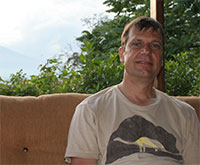 Tony L. Huynh
Tony L. Huynh
Department of Integrative Biology
University of California, Berkeley
Berkeley, California 94720-3140 USA
huynhtony@berkeley.edu
Tony L. Huynh received an undergraduate degree from the department of Integrative Biology at UC Berkeley in 2012. He likes using tools and approaches from mechanical engineering, computer-aided 3D design, and computed tomography (CT imaging) to answer evolutionary and ecological questions related to functional morphology. He is always on the hunt for another specimen to put into a CT scanner and has worked with vertebrates, invertebrates, and plants, along the entire range of geologic time. He is currently the lab manager for a metabolic physiology lab specializing in invertebrates at UC Berkeley.

 Dennis Evangelista
Dennis Evangelista
Department of Biology
University of North Carolina at Chapel Hill
Chapel Hill, North Carolina 27599-328
USA
devangel@live.unc.edu
Dennis Evangelista is a postdoctoral researcher in comparative biomechanics. He studied mechanical and electrical engineering at MIT and Naval Postgraduate School before earning a PhD in Integrative Biology at UC Berkeley. He enjoys working with undergraduates, flight, swimming, maneuvering and control, behavior of aggregations, evolution, and biomechanics in extreme environments, and has worked on vertebrates, invertebrates, and plants, both extinct and extant. He is a good cook and is raising a guide dog puppy.

 Charles R. Marshall
Charles R. Marshall
University of California Museum of Paleontology and Department of Integrative Biology
University of California, Berkeley
Berkeley, California, 94720-478
USA
crmarshall@berkeley.edu
Charles Marshall is currently the Director of the University of California Museum of Paleontology and a Professor in the Department of Integrative Biology at the University of California, Berkeley. His undergraduate degree from the Australian National University was in geology (especially in palaeontology), zoology, applied mathematics, physical chemistry, and history, and included the equivalent of a Masters thesis on lungfish. His Ph.D. (on sand dollars) was from the Committee on Evolutionary Biology at the University of Chicago, followed by an NIH postdoc in evo-devo with Rudy Raff at Indiana University (where he shifted to regular echinoids). His research interests have been described as being pathologically broad, which does not seem to be an unfair description.

